一般过去时态和现在完成时态的区别练习题
一般过去时与现在完成时区别专题与练习
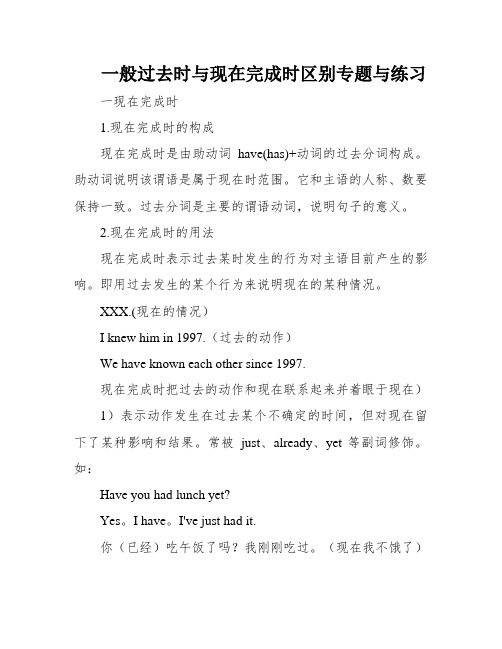
一般过去时与现在完成时区别专题与练习一现在完成时1.现在完成时的构成现在完成时是由助动词have(has)+动词的过去分词构成。
助动词说明该谓语是属于现在时范围。
它和主语的人称、数要保持一致。
过去分词是主要的谓语动词,说明句子的意义。
2.现在完成时的用法现在完成时表示过去某时发生的行为对主语目前产生的影响。
即用过去发生的某个行为来说明现在的某种情况。
XXX.(现在的情况)I knew him in 1997.(过去的动作)We have known each other since 1997.现在完成时把过去的动作和现在联系起来并着眼于现在)1)表示动作发生在过去某个不确定的时间,但对现在留下了某种影响和结果。
常被just、already、yet等副词修饰。
如:Have you had lunch yet?Yes。
I have。
I've just had it.你(已经)吃午饭了吗?我刚刚吃过。
(现在我不饿了)2)透露表现从曩昔某一时辰入手下手一向连续到目前的举措或状况。
这个举措大概刚截止,大概仍旧在举行。
常带有for和since等透露表现一段工夫的状语。
如:He has taught here since 1981他自1981年就在这儿教书。
(大概还要连续教)I XXX her for four years.我有四年没见到她了。
3)表示说话前发生过一次或多次的动作,现在成为一种经验,一般译为汉语“过”,ice。
ever。
never。
three times等时间状语。
如:I have been to Beijing twice.我去过北京二次。
3.现在完成时的时间状语1)目前完成时属于目前时范围,故不克不及和曩昔的工夫状语连用。
如:yesterday,lastSunday,in1990,three years ago 等。
可是,在夸大举措产生的结果和影响时,能够和一些透露表现不肯定的工夫状语连用。
一般过去时--现在完成时--区别及练习题

现在完成时与一般过去的区别1.两个时态的侧重点不同现在完成时强调的是过去的动作对现在的影响,它和现在有密切的联系。
一般过去时强调的是动作发生的时间、地点,不涉及对现在的影响。
She has seen the film before. 她看过这部电影。
(强调她已经看过了)She saw the film last night. 她昨晚看了这部电影。
(强调时间是昨晚)Mr Green has bought a new computer. 格林先生买了一台新电脑。
(强调格林先生现在有了一台新电脑)Mr Green bought a new computer yesterday. 格林先生昨天买了一台新电脑。
(强调买新电脑的时间是昨天)。
2.两个时态的时间状语不同。
现在完成时常与already,yet,just,ever,never,before等副词以及“for+一段时间”,“since+过去时间/从句”等时间状语连用。
不能单独与表示过去的时间状语连用。
一般过去时则常与“一段时间+ago”,just now,yesterday,last week等表示过去时间的状语连用。
Mike has lived in Beijing for 5 years. 麦克在北京住了五年了。
(强调已经住了五年)Mike lived in Beijing 5 years ago. 五年前麦克住在北京。
(强调时间点是五年前)Lucy has just called you. 露西刚打过电话给你。
(强调已经打过电话了)Lucy called you just now. 露西刚才给你打了电话。
(强调打电话的时间是刚刚)注意点:(现在完成时的常用句型1.It is the first / sec ond time…. that…结构中的从句部分用现在完成时.It was the second time that the girl had been late. 这是女孩第二次迟到了。
英语时态中的一般过去时以及现在完成时讲解与练习(精品),适用于初中水平较好以及高中水平较差的同学

英语时态讲解与练习(二)一、一般过去时一般过去时是由动词的过去式来表示的。
一般过去时表示过去某一具体时间发生的动作或存在的状态。
动词的过去式的构成分为规则与不规则两类。
一般过去时的基本构成:规则动词后+ed1.表示过去发生的动作,与现在毫无联系,与确定的时间状语词连用,如:then,at thattime,just now,yesterday,last year,in 1998,……ago2.表示过去习惯动作,只适用于动态动词Eg.When she was in Beijing,she often came to see me.二、现在完成时(重点及难点)构成:助动词have/has+过去分词①表示过去发生的动作,对现在造成的结果或影响。
常与already, just, yet, in the last few years, so far,--Have you had your lunch yet?--yes, I have. I have just had it.(现在我不饿了)I have already posted the photos.(这些照片已不在这里了)②表示动作或状态从过去某个时间开始,一直延续到现在,可能刚刚结束,也可能继续下去。
常与for, since引导的时间状语连用(For+一段时间,Since+某一点时间),可以用how long提问。
其中“for+一段时间”用在肯定句中,动词必须是延续性动词;在否定句中,延续性动词或短暂性动词均可。
Since连接的从句中,常用短暂性动词的一般过去时。
I have known Li Ming for three years.They have lived here since 1996.They have lived here since they graduated from university.She has taught us since I came to this school.How long have you worked in this factory?现在完成时和一般过去时的区别现在完成时表示过去发生的某一动作对现在造成的影响或结果,强调的是现在的情况,所以它不能和表示过去的时间状语连用。
现在完成时练习及讲解

现在完成时态练习题一选择填空。
( ) 2. Her father ______in1990 and her husband ______for more than five years.(A) died ,dead (B) has died, dead(C) died ,has been dead (D) has died, has died( ) 3. I have _____this nice watch for two years.(A) had (B) bought (C) borrowed (D) lend( ) 4.He _____his home for ten years.(A)has left (B)left from(C)has been away from (D)was away from( ) 5.He _____a league member for three years(A)is (B)has been (C)has become (D)have become ( ) 6.Lihua's brother has _______for two years(A)joined the army (C)become a soldier(B)been an army (D)been in the army( ) 7.He hasn't _____Quanzhou ever since he left school (A) left (B)been away (C)been (D)away二选择填空( ) 1. ——Have you finished your homework ——Yes, I_______it last night(A) finish (B)finished (C)have finished (D)will finish ( ) 2.—— ________you ever _______to Nanjing ——Yes, I ______there last year. (A)Have…gone, have gone (B)Did…go, went (C)Have…been , went (D)Did…go, has , been )( ) 3.——When _______you ________Lucy in New York? ——I _________her for two years(A) did…meet, haven't se en (B)did…meet, don't see (C) have…met, haven't seen( ) 4.He ______finished his homework yet .( A) didn’t(B)haven’t(C) hasn’t(D) doesn’t have( )5.——Have you ________traveled on the banch? ——Yes, I have.(A)just (B)yet C)never (D)ever( )6..——Have you finished yourhomework ——Not__________(A)ever (B)already . (C)yet (D)just .( ) 7 We haven't finished our homework,_____.(A) already ( (B)ever (C)yet (D)never( )8.——Have you__________ learned English? ——Yes, I've ________learned a lot.(A)never, ever (B)ever, never(C)ever, already (D)already. ever( ) 9.——Have you finished your homework ________? ——Yes, I've _____done that.(A) yet, already (B)already, yet (C)ever,never (D)still, just( )10.John's father _______borrowed some pictures(A ) has just (B)have ever (C)has yet (D)have already三用since 和for 填空(一)1) ______ two years _______ two years ago 2) _______ last month 3) _______ yesterday 4) _______ an hour ago 5)______ she left here 6) _______ 4 o’clock 8) ______ 1999 9) ______ 4 hours 10) _____ lunch time(二)1. He has lived in Nanjing ________ the year before last.2. I’ve known him __________ we were children.3. Our teacher has studied Japanese _________ three years.4. She has been away from the city ___________ about ten years.5. It’s about ten years __________ she left the city.四单项选择题( )1.My mother has worked in this factory _____2 years. (A)about ( (B)for (C)in (D)since()2. His father joined the party_________(A)since three years ago (B)in two years' time(C)for three years (D)three years ago3. The students have cleaned the classroom , ________?A. so theyB. don’t theyC. have theyD. haven’t they4.We came to Nanjing three years ago, so we ________ here for three years.A. have been toB. have been inC. have beenD. have gone5.- How long ______you_______ your dictionary?- About two months.A. did; buyB. have; getC. have; hadD. have; bought6. He tells me he________ China for over five years. A. has been B. has been inC. has been toD. has gone to China7.________has Mr White been a member of Greener China since he _______ to Nanjing?A. How soon , comesB. How often, gotC. How long , cameD. How far, arrived8. His uncle________ for more than 9 years.A. has come hereB. has started to workC. has lived thereD. has left the university9. He has never surfed, __________(改成反意疑问句)?10. They have been here since 2000 . (对划线部分提问)__________ have they been here?11. The old man _________last year. He________ for a year.(die)12. This factory opened twenty years ago.(改写句子,句意不变)12 This factory has been open for twenty years五、用have(has) been 或have(has) gone 填空。
高考英语语法专项---动词时态语态(含解析)

高考英语动词时态语态(含解析)1、The teacher, with 6 girls and 8 boys in her class, _____ visiting a museum when the earthquake struck.A.were B.Was C.had been D.would be2、In such dry weather, the flowers will have to be watered if they ____________A. have survivedB. are to surviveC. would surviveD. will survive3、I first met Mr. Smith in America. He ______ at Stanford University then.A. studiedB. has studiedC. is studyingD. was studying4、They won’t buy new clothes because they ______ money to buy a new house.A. saveB. are savingC. have savedD. were saving5、So far this year we ______ a fall in house prices by between 5 and 10 percent.A. sawB. seeC. had seenD. have seen6、By the time he realizes he ____into a trap, it’ll be too late for him to do anything about it.A. walksB. walkedC. has walkedD. had walked7、---Do you have any problems if you ___this job?---Well, I’m thinking about the salary.A. offerB. will offerC. are offeredD. will be offered8、—Did you see a man in black pass by just now?—No, sir. I ___ a newspaper.A. readB. was readingC. would readD.am reading9、I_____ in London for many years, but I’ve never regretted my final decision to move back to China.A. livedB. was livingC. have livedD. had lived10、.Mr. Li_____a secretary for five years in the company, and now he is the general manager of it.A. isB. wasC. had beenD. has been11、He _____the job well, but he ____so careless.A. had done; had beenB. could do; wasC. could have done; wasD. hadn’t done; had been12、They said good-bye, hardly knowing that they ______again.A. were never metB. will never meetC. never metD. were never to meet13、. All of the guests ___________ by 9 o’clock , but the host _____________ until 15 minutes later .A. arrived; didn’t turn upB. had arrived; didn’t turn upC. arrived; hadn’t turned up D .had arrived; hadn’t turned up14、He ______ at the meeting, but his heart attack prevented him.A. will speakB.is going to speakC. had to speakD.was going to speak15、In fact, more and more people ____ to live a greener, healthier and more environmentally “green life”.A、choseB、chooseC、are choosingD、have chosen16、The pen my father sent me as my birthday gift very well.A.is writtenB. writesC. writingD. has written17、In such dry weather the flowers will have to be watered if they _____.A. have survivedB. would surviveC. are to surviveD. will survive18、Although medical science control over several dangerous diseases,what worries usis that some of them are returning.A.achieved B.has achieved C.will achieve D.had achieved19、--- I think the waiter has forgotten us. We ________ here for over half an hour!--- I think you’re right. He probably thinks we have already ordered.A.are waiting B.have been waitingC.have waited D.will wait20、The new secretary is supposed to report to the manager as soon as she _______.A. will arriveB. arrivesC. is going to arriveD. is arriving21、If you ____________ stop smoking, you can only expect to have a bad cough.A. won’tB. would notC. do notD. can not22、Months ago we sailed ten thousand miles across this open sea, which______ the Pacific, and we met no storms.A. was calledB.is calledC. had been calledD. has been called23、I’d rather you did some social research when you are free, but you _____.A. didn’tB. weren’tC. wouldn’tD. don’t24、You ______ television. Why not do something more active?A. always watchB. are always watchingC. have always watchedD. have always been watching25、. —Do you know if the football game has started yet?—Started? It must be certain who ________ by now.A. is winningB. winsC. has wonD. would win26、Once our supplies _______, we will take the risk of starving to death.A. have dried outB. are given outC. have dried upD. have been run out27、—Such a mistake could have been avoided.—Unfortunately, he _______ the mistake again and again.A.repeated B. would repeatC.had repeated D. would have repeated28、---- “Alice, why didn't you come yesterday?”----- “I______, but I had an unexpected visitor.A. hadB. wouldC. was going toD. did29、---- “I haven't heard from Henry for a long time.”------ “What do you suppose_____ to him?A. was happeningB. to happenC. has happenedD. had happened30、My pain _____ obvious the moment I entered the office,for the first man I met asked pitifully,“Are you feelingall right?”A.could be B.could have been C.must be D.must have been31、Let’s keep to the point or we ______ any decisions.A. will never reachB. have never reachedC. never reachD. never reached32、—Has Sam finished his homework today ?—I have no idea. He ______ it this morning.A. didB. has doneC. was doingD. had done33、—If the traffic hadn’t been so heavy, I could have been back by 6 o’clock.—What a pity ! Tina _____ here to see you.A. isB. wasC. would beD. has been34、—It is around 100 years, known to us all, ______ the first modern Olympic Games was held.—It really is. But were _____ ?A. that; was thatB. since; was itC. after; is thatD. when; is it35、—We __that you would fix the TV set this week.—I’m sorry. I __to, but I’ve been too busy.A. had expected;had intendedB. are expecting;had intendedC. expect;intendD. expected;intend36、I didn’t like Aunt Lucy, who__without warning and bringing us presents.A. always turned upB. has always turned upC. was always turning upD. was always turned up37、. I think you must be mistaken about seeing him at the theatre; I’m sure he _____ abroad all week.A. isB. wasC. has beenD. had been38、—He _____to the meeting. Have you informed him of it?—Sorry. I______to.A. hasn’t come; am goingB. didn’t come; have forgottenC. hasn’t come; forgotD. doesn’t come; will have39、—Why ! Where's my passport? Maybe I left it on the plane.--My Goodness ! You ____________ things behind.A. had never leftB. didn't leaveC. never leftD. haven’t left40、—Did you watch the basketball match yesterday?—Yes, I did. You know, my brother _________ in the match.A. is playingB. was playingC. has playedD. had played参考答案1、B2、B解析:此句的主句是将来时,条件状语从句要用一般现在时表示将来时。
现在完成时与一般过去时的用法区别
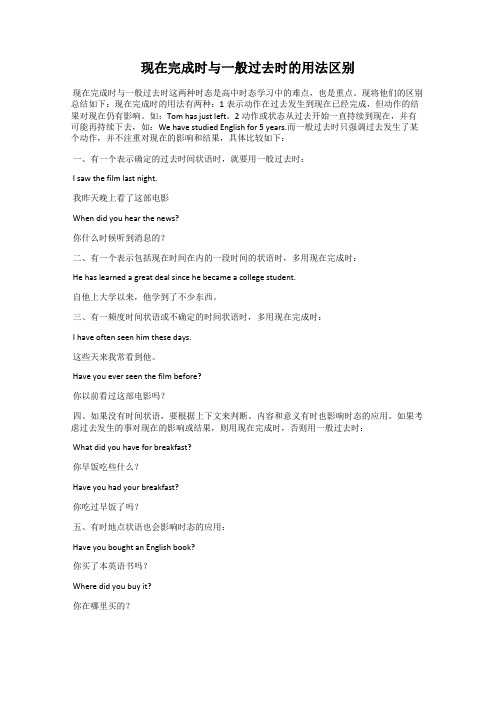
现在完成时与一般过去时的用法区别现在完成时与一般过去时这两种时态是高中时态学习中的难点,也是重点。
现将他们的区别总结如下:现在完成时的用法有两种:1表示动作在过去发生到现在已经完成,但动作的结果对现在仍有影响。
如:Tom has just left。
2动作或状态从过去开始一直持续到现在,并有可能再持续下去,如:We have studied English for 5 years.而一般过去时只强调过去发生了某个动作,并不注重对现在的影响和结果,具体比较如下:一、有一个表示确定的过去时间状语时,就要用一般过去时:I saw the film last night.我昨天晚上看了这部电影When did you hear the news?你什么时候听到消息的?二、有一个表示包括现在时间在内的一段时间的状语时,多用现在完成时:He has learned a great deal since he became a college student.自他上大学以来,他学到了不少东西。
三、有一频度时间状语或不确定的时间状语时,多用现在完成时:I have often seen him these days.这些天来我常看到他。
Have you ever seen the film before?你以前看过这部电影吗?四、如果没有时间状语,要根据上下文来判断。
内容和意义有时也影响时态的应用。
如果考虑过去发生的事对现在的影响或结果,则用现在完成时,否则用一般过去时:What did you have for breakfast?你早饭吃些什么?Have you had your breakfast?你吃过早饭了吗?五、有时地点状语也会影响时态的应用:Have you bought an English book?你买了本英语书吗?Where did you buy it?你在哪里买的?六、有时还要看动词所表示的动作是否能在现在或将来重复进行,能重复者多用现在完成时,否则用过去时:Lei Feng visited the factory three times.这个工厂雷锋参观过三次。
高中英语最实用语法一般过去时、现在完成时、将来完成时讲解和经典习题
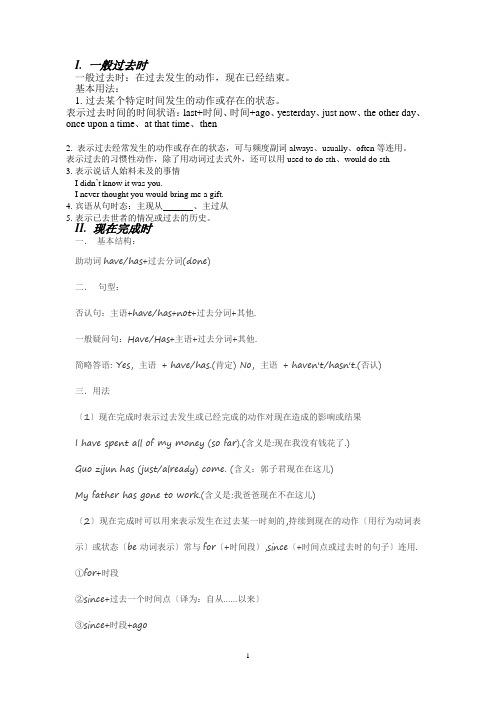
I. 一般过去时一般过去时:在过去发生的动作,现在已经结束。
基本用法:1.过去某个特定时间发生的动作或存在的状态。
表示过去时间的时间状语:last+时间、时间+ago、yesterday、just now、the other day、once upon a time、at that time、then2. 表示过去经常发生的动作或存在的状态,可与频度副词always、usually、often等连用。
表示过去的习惯性动作,除了用动词过去式外,还可以用used to do sth、would do sth3.表示说话人始料未及的事情I didn’t know it was you.I never thought you would bring me a gift.4.宾语从句时态:主现从、主过从5.表示已去世者的情况或过去的历史。
II. 现在完成时一.基本结构:助动词have/has+过去分词(done)二.句型:否认句:主语+have/has+not+过去分词+其他.一般疑问句:Have/Has+主语+过去分词+其他.简略答语: Yes, 主语+ have/has.(肯定) No, 主语+ haven't/hasn't.(否认)三.用法〔1〕现在完成时表示过去发生或已经完成的动作对现在造成的影响或结果I have spent all of my money (so far).(含义是:现在我没有钱花了.)Guo zijun has (just/already) come. (含义:郭子君现在在这儿)My father has gone to work.(含义是:我爸爸现在不在这儿)〔2〕现在完成时可以用来表示发生在过去某一时刻的,持续到现在的动作〔用行为动词表示〕或状态〔be动词表示〕常与for〔+时间段〕,since〔+时间点或过去时的句子〕连用.①for+时段②since+过去一个时间点〔译为:自从……以来〕③since+时段+ago④主句〔现在完成时〕since+从句〔一般过去时〕→主完从过●⑤It is/ has been +时段+since+从句〔过去时〕Mary has been ill for three days.I have lived here since 1998.⑥It is + 第几次〔the first time〕that + 句子〔现在完成时〕四. has gone (to),has been (to), has been (in) 的区别Have/Has gone(to) :去了(现在不在说话现场)Where is your father?He has gone to Shanghai.Have/Has been (to) :去过〔已不在去过的地方〕My father has been to Shanghai.Have/has been in:呆了多久〔还在所呆的地方〕My father has been in Shanghai for two months. /since two months ago. 五.现在完成时的标志1. 现在完成时的含义之一是过去完成的动作对现在仍有影响,用以下四大标志词可以表达这种含义:* 以already, just和yet为标志He has already got her help. 他已得到她的帮助。
英语16种时态及练习题附答案
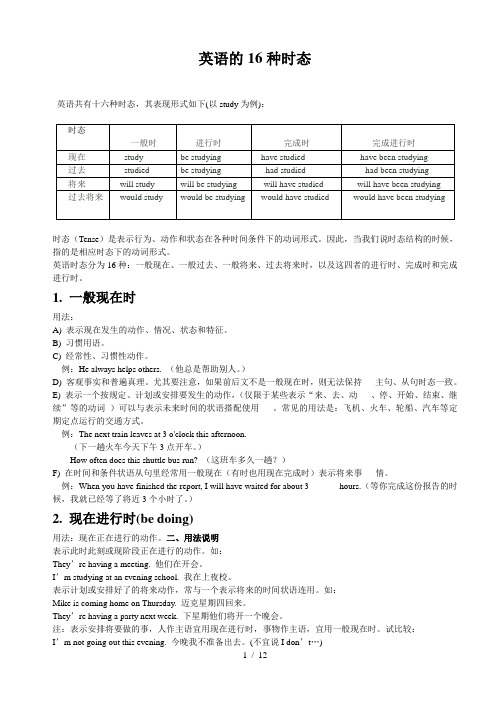
英语的16种时态英语共有十六种时态,其表现形式如下(以study为例):时态(Tense)是表示行为、动作和状态在各种时间条件下的动词形式。
因此,当我们说时态结构的时候,指的是相应时态下的动词形式。
英语时态分为16种:一般现在、一般过去、一般将来、过去将来时,以及这四者的进行时、完成时和完成进行时。
1. 一般现在时用法:A) 表示现在发生的动作、情况、状态和特征。
B) 习惯用语。
C) 经常性、习惯性动作。
例:He always helps others. (他总是帮助别人。
)D) 客观事实和普遍真理。
尤其要注意,如果前后文不是一般现在时,则无法保持主句、从句时态一致。
E) 表示一个按规定、计划或安排要发生的动作,(仅限于某些表示“来、去、动、停、开始、结束、继续”等的动词)可以与表示未来时间的状语搭配使用。
常见的用法是:飞机、火车、轮船、汽车等定期定点运行的交通方式。
例:The next train leaves at 3 o'clock this afternoon.(下一趟火车今天下午3点开车。
)How often does this shuttle bus run? (这班车多久一趟?)F) 在时间和条件状语从句里经常用一般现在(有时也用现在完成时)表示将来事情。
例:When you have finished the report, I will have waited for about 3 hours.(等你完成这份报告的时候,我就已经等了将近3个小时了。
)2. 现在进行时(be doing)用法:现在正在进行的动作。
二、用法说明表示此时此刻或现阶段正在进行的动作。
如:They’re having a meeting. 他们在开会。
I’m studying at an evening school. 我在上夜校。
表示计划或安排好了的将来动作,常与一个表示将来的时间状语连用。
如:Mike is coming home on Thursday. 迈克星期四回来。
一般过去时和现在完成时练习题-含答案(推荐5篇)

一般过去时和现在完成时练习题_含答案(推荐5篇)第一篇:一般过去时和现在完成时练习题_含答案一般过去时和现在完成时练习题1.A.用 already或 yet1)Have they taken down the old pictures ______? No, they haven’t____ ___.2)Most of us have finished our compositions _____.3)He said he hadn’t visited the exhibition _____ ___.B.用since或 for1)We have learned five lessons __ ___ the beginning of this term.2)Mrs Liao has been in hospital __ _ ___last week.3)I have stayed at my aunt’s _____two weeks.C.用have gone或 have been1)Where are the boy students? They _____ to the school factory.2)Is your father in? No, he ____ to Shenzhen._______he ever ______ there before ?Yes, he ___ there several times3)He asked me if I_____ to Hangzhou before.I told him that I wanted to go there for a visit as I ____ never ____ to that city before.2.选择填空1.Mother ____me a new coat yesterday.I _______ it on.It fits me well.A.had made…have triedB.made…have tried C.has made…triedD.made…tried2 “He ____to draw horses already”.“When ______ he ?” “ Last year “A.learned...hasB.learned...didC.has learned...hasD.has learned (i)3.Tom _____up into the tree.Look, he ____ high up there!A.has got…isB.has climbed…wasC.got …wasD.climbed…is4.____ you _____ the text yet ? Yes, we ____ it two hours ago.A.Did...copy...didB.Have...copied...haveC.Have...copied (i)D.Did …copy…had5.“Why ______ she _______ angry ?” “Because he _____ at her just now.”A.did…get…shoutedB.has…got…shoutedC.did…get…has shoutedD.has…got…has shouted6.______you __________ the film before ? Where _____ you ____ it ?A.Have …seen…did…seeB.Did …see…did…watchC.Have…see n…have…seenD.Did …see…have…seen7.You ____ me waiting for two hours.I ____ for you since five.A.kept…waitedB.have kept…waitedC.kept…have waitedD.have kept…have waited8.Where ______ John _______ ? To the library.He _________ there for an hour.A.has…been…has gone B.has…gone…has beenC.did…go…wentD.did…be…went9.______ the baby still _____ ? No, it _______ crying.A.Has…cried…has stopped B.Is…crying…stoppedC.Did …cry…stoppedD.Is…crying…has stopped10.I _______ the way.I ________ here for quite many years.A.knew...have livedB.knew...liveC.know...have livedD.know (iv)11._____ you ever _____ America ? Yes, I have.A.Have…gone toB.Have…gone inC.Have…been toD.Have …been in12.My brother ____college for over three years.A.has gone toB.has been to C.has been inD.has been at13.He ________ the Army by the end of 1989.He ______ in the army since then.A.joined…isB.has joined…has beenC.had joined…isD.had joined …has been14.By the time I _____ back they ____ up ten satellites.A.came…have sentB.came…had e…havesentD.had come…sent15.Jack ____ over five lessons by seven o’clock.Then he ____a rest.A.went…tookB.went…had takenC.had gone…tookD.had gone…had taken16.We ____ out by that time that he ____ a spy for a long time.A.had found…had beenB.had found…wasC.found…had beenD.found…was17.Before the news ____ him, he ____ to know about it.A.reaches…has got B.reached…had got C.reached…gotD.had reached…got18.I _____ him a second letter before I ____ from him.A.wrote…heardB.wrote…had heardC.had written…heardD.have written…hear19.People ____ that the soldiers _____ fighting.A.say…had stoppedB.said…has stoppedC.say…stoppedD.said…had stopped20.We ____ in a good harvest because we ____ enough rain.A.didn’t get…had hadB.got…had hadC.had got…had hadD.got…hadn’t had21.They _______ for five hours when they ______ in New York.A.flew…arrivedB.had flown…had arrivedC.flew…had arrivedD.had flown…arrived22.She ____ that it _____ for two days by that day.A.says…has ra inedB.says…had rainedC.said…had rainedD.said…rained23.John _____ there since the year before, so he _____ them.A.had worked…knewB.had worked…had knownC.worked…knewD.worked…had known24.He _____ angry because he ____ for a long time.A.had got…had waitedB.got…waitedC.had got…waitedD.got…had waited25.-I have seen the film “Titanic” already.-When __________you __________ it?-The day before yesterday.A.have; seenB.will; seeC.did;seeD.did; seen26.Mr Black __________ in China since five years ago.A.livedB.has livedC.livesD.is going to live27.We ____________ trees last Sunday.So far we __________ over 3,000 trees there.A.planted; plantedB.planted; have plantedC.have planted; plantedD.have planted; have planted练习答案:1.A.1)yet, yet2)already3)yetB.1)since2)since3)sinceC.1)have been2)has gone, Has, been, has been3)have been, have been2.BDACAADBDCCDDBCABCDBDCADCBB第二篇:一般过去时与现在完成时比较练习题一般过去时与现在完成时比较练习题I.用所给动词的适当形式填空。
高中英语时态及练习

高中英语时态及练习一、一般现在时1、表示现在发生的动作或存在的状态,常与every day,once a week,in the morning,at present等连用。
例:They don’t usually have enough money to go to the movies.2、表示主语具备的性格和能力等。
例:Mary can speak three languages.3、表示经常性或习惯性的动作,常与always,never,sometimes,often等连用。
例:I never eat fast food.4、表示现在提出的建议或要求。
例:Could you please help me with my math homework?二、现在进行时1、表示正在发生的动作或存在的状态。
例:He is studying for his history exam.2、表示现阶段正在进行的动作,但这个动作不一定正在进行。
例:My brother is preparing for his college entrance exams.3、表示即将发生的动作,常与表示将来的时间副词连用。
例:We are about to start our journey.三、现在完成时1、表示过去发生的动作对现在造成的结果。
例:I have just finished my homework.2、表示过去开始一直持续到现在的动作或状态,并可能继续下去。
例:They have been married for 20 years.四、一般过去时1、表示过去某个时间发生的动作或存在的状态。
例:We saw a movie last night.2、表示过去经常或反复发生的动作。
例:He always went to the park in the morning.高中英语时态练习英语时态是英语语法中非常重要的一个部分,也是我们在学习英语过程中必须要掌握的知识。
英语16种时态及练习题附答案

英语的16种时态英语共有十六种时态,其表现形式如下(以study为例):时态(Tense)是表示行为、动作和状态在各种时间条件下的动词形式。
因此,当我们说时态结构的时候,指的是相应时态下的动词形式。
英语时态分为16种:一般现在、一般过去、一般将来、过去将来时,以及这四者的进行时、完成时和完成进行时。
1. 一般现在时用法:A) 表示现在发生的动作、情况、状态和特征。
B) 习惯用语。
C) 经常性、习惯性动作。
例:He always helps others. (他总是帮助别人。
)D) 客观事实和普遍真理。
尤其要注意,如果前后文不是一般现在时,则无法保持主句、从句时态一致。
E) 表示一个按规定、计划或安排要发生的动作,(仅限于某些表示“来、去、动、停、开始、结束、继续”等的动词)可以与表示未来时间的状语搭配使用。
常见的用法是:飞机、火车、轮船、汽车等定期定点运行的交通方式。
例:The next train leaves at 3 o'clock this afternoon.(下一趟火车今天下午3点开车。
)How often does this shuttle bus run? (这班车多久一趟?)F) 在时间和条件状语从句里经常用一般现在(有时也用现在完成时)表示将来事情。
例:When you have finished the report, I will have waited for about 3 hours.(等你完成这份报告的时候,我就已经等了将近3个小时了。
)2. 现在进行时(be doing)用法:现在正在进行的动作。
二、用法说明表示此时此刻或现阶段正在进行的动作。
如:They’re having a meeting. 他们在开会。
I’m studying at an evening school. 我在上夜校。
表示计划或安排好了的将来动作,常与一个表示将来的时间状语连用。
如:Mike is coming home on Thursday. 迈克星期四回来。
现在完成时态讲解及练习

现在完成时态讲解及练习一、现在完成时的构成肯定句:主语+have/ has + done (过去分词)+其它He has lived in Shenzhen for 4 years.一般疑问句:Have/ Has +主语+ done (过去分词)+其它Has he lived in Shenzhen for 4 years?否定句: 主语+have/ has+ not + done (过去分词)+其它He has not finished his homework.过去分词的构成方法如下 :1.一般情况下,直接在动词原形后面加 –ed.work---worked answer---answered obey---obeyed want---wanted 2.以不发音的 -e 结尾的动词只加 –d.Move---moved hope---hoped divide---divided 3.字尾是辅音+y 的动词。
则将y 改i 加ed. study---studied tidy---tidied satisfy---satisfied4.以重读闭音节结尾的词,这些词的末尾只有一个辅音字母时,双写这个辅音字母,再加 –ed. stop---stopped regret--- regretted drop---dropped不规则动词过去式与过去分词分类记忆表一、AAA. (原形,过去式和过去分词一致)二、ABB (过去式和过去分词一致)3) 过去式、过去分词-t 替换原形-d6) 过去式、过去分词改为-elt二、现在完成时标志词:recently; recent years; these days/ years; lately; since; for+时间段;in the past few years; ever since; in the last five months; up to now; since then; so far; ever; never, yet; once; twice; already; before; just already (已经): 用于肯定句I have already posted the letter .yet(已经): 用于否定句,疑问句He hasn’t done his homework yet.just(刚刚)They have just left.ever(曾经)Have you ever been to Beijing ?never(从不)I have never seen him .before(以前)Have you seen the film before?since(自从…以来)I’ve worked in the school since 1999.for(长达)He’s lived in Shenzhen for 6 years.in the past several days / weeks/ years(在过去的…)recently(最近)I have not written to my parents recently.so far(到目前为止)So far she has learned 5 English songs.up to now(到目前为止)this morning/month/year(今天早上/这个月/今年)三、现在完成时的用法1)现在完成时表示过去发生的动作,并对现在有影响。
现在完成时态的用法及与一般过去时态的区别

现在完成时态的用法及与一般过去时态的区别Step1知识讲解一.现在完成时的构成:助动词have(has)+ 过去分词,表示过去发生或完成的某一动作对现在造成的影响或结果。
例如:I have just cleaned my clothes. 我刚洗过衣服。
(“洗衣服”是发生在过去的动作,对现在造成的结果是“衣服干净了”)A) 现在完成时常用的时间状语有:already (”已经”用于肯定句的中间和末尾处)never (“从不”用于中间处)ever (”曾经”用于疑问句和肯定句的中间处)just (“刚刚”用于中间处)yet (“已经”用于疑问句的末尾处/ “还”用于否定句的末尾处)B) 或不加任何的时间状语,但不能和表示过去的时间状语连用.二. 现在完成时与一般过去时的用法比较现在完成时表示过去的动作一直延续到现在甚至会继续下去或表示过去的动作对现在造成的影响;一般过去时表示动作发生的时间在过去。
试比较:The plane has arrived . 飞机已经来了。
(说明现在的情况:飞机在这儿)The plane arrived a quarter ago. 飞机是一刻中以前来的。
(强调动作发生的时间在过去)I have taught here for fifteen years.我在这儿已教了十五年(表示十五年前的动作一直延续到现在,还可能会继续。
)I taught here for a year. 我过去在这儿教过一年。
(表示“我“现在已经不在这儿任教了)练习:I.翻译下列句子:1. 你曾经吃过鱼和薯条吗?Have you ever eaten fish and chips?2. 我刚刚丢了我的化学书。
I have just lost my chemistry book.3. 我以前从来没去过那个农场。
I have never been to that farm before.4. 他已经吃过午饭了。
中考英语时态基础知识点(现在完成时、将来时、过去时、现在进行时、一般现在时)以及习题整理
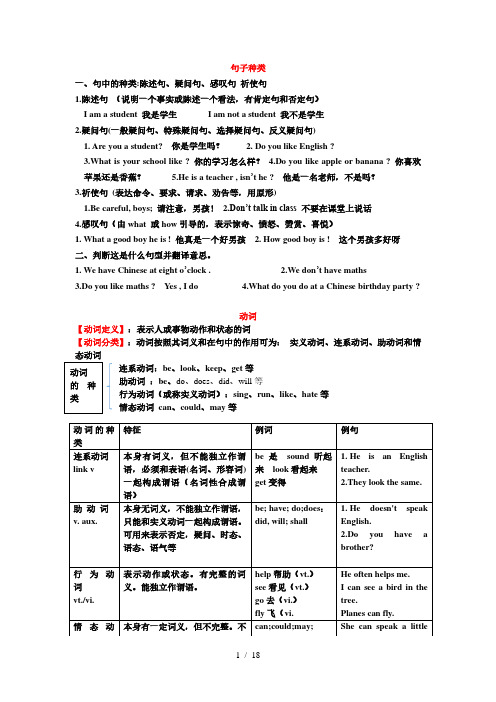
句子种类一、句中的种类:陈述句、疑问句、感叹句 祈使句1.陈述句 (说明一个事实或陈述一个看法,有肯定句和否定句) I am a student 我是学生 I am not a student 我不是学生2.疑问句(一般疑问句、特殊疑问句、选择疑问句、反义疑问句) 1. Are you a student? 你是学生吗? 2. Do you like English ?3.What is your school like ? 你的学习怎么样?4.Do you like apple or banana ? 你喜欢苹果还是香蕉?5.He is a teacher , isn ’t he ? 他是一名老师,不是吗? 3.祈使句 (表达命令、要求、请求、劝告等,用原形)1.Be careful, boys; 请注意,男孩!2.Don’t talk in class 不要在课堂上说话 4.感叹句(由what 或how 引导的,表示惊奇、愤怒、赞赏、喜悦)1. What a good boy he is ! 他真是一个好男孩2. How good boy is ! 这个男孩多好呀 二、判断这是什么句型并翻译意思。
1. We have Chinese at eight o ’clock .2.We don ’t have maths3.Do you like maths ? Y es , I do4.What do you do at a Chinese birthday party ?动词【动词定义】:表示人或事物动作和状态的词【动词分类】:动词按照其词义和在句中的作用可为: 实义动词、连系动词、助动词和情态动词连系动词:be 、look 、keep 、get 等 助动词 :be 、do 、does 、did 、will 等 行为动词(或称实义动词):sing 、run 、like 、hate 等 情态动词 can 、could 、may 等提问: 1.举出三个系动词,并说出它的特征。
一般过去时和现在完成时的区别
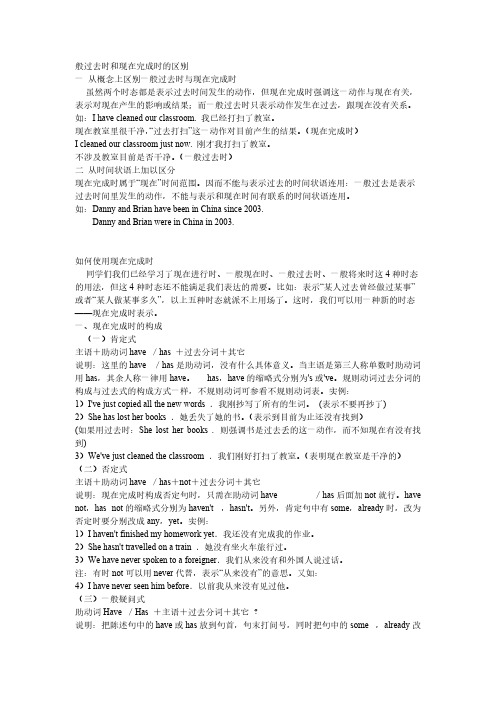
1)I've just copied all the new words .我刚抄写了所有的生词。 (表示不要再抄了)
2)She has lost her books .她丢失了她的书。(表示到目前为止还没有找到)
(如果用过去时:She lost her books . 则强调书是过去丢的这一动作,而不知现在有没有找
—Yes ,I have .是的,我做过。
2)—Has she ever been abroad ?她曾经出过国吗?
—No,never.不,从来没有。
3)—Have they found the lost books yet ?他们已经找到了丢失的书吗?
—Yes ,they have.是的,他们找到了。
3.just 意为“刚刚”,表示行为刚刚过去,常放在助动词与过去分词之间。实例:
He has just come back from school .他刚从学校回来。
4.ever 意为“曾经”,用于疑问句或否定句中,放在助动词与过去分词之间。实例:
1)Have you ever been to Hong Kong ?你曾去过香港吗?
加部分用肯定形式。例如:You have never come to our school ,have you ?你以前从来没
有来过我们学校,是吗?
二、过去发生或已经完成的某一动作对现在造成的影响或结
果。此时,常与时间副词 already(已经),yet(还、已经)
词):表示过去已经开始,持续到现在的动作或状态。此时常与“for
+一段时间或
“since+过去的点时间或从句(从句用一般过去时)以及 so far(到目前为止)等时间状语
对全部高中资料试卷电气设备,在安装过程中以及安装结束后进行高中资料试卷调整试验;通电检查所有设备高中资料电试力卷保相护互装作置用调与试相技互术关,系电,力根通保据过护生管高产线中工敷资艺设料高技试中术卷0资配不料置仅试技可卷术以要是解求指决,机吊对组顶电在层气进配设行置备继不进电规行保范空护高载高中与中资带资料负料试荷试卷下卷问高总题中2体2资配,料置而试时且卷,可调需保控要障试在各验最类;大管对限路设度习备内题进来到行确位调保。整机在使组管其高路在中敷正资设常料过工试程况卷中下安,与全要过,加度并强工且看作尽护下可关都能于可地管以缩路正小高常故中工障资作高料;中试对资卷于料连继试接电卷管保破口护坏处进范理行围高整,中核或资对者料定对试值某卷,些弯审异扁核常度与高固校中定对资盒图料位纸试置,.卷编保工写护况复层进杂防行设腐自备跨动与接处装地理置线,高弯尤中曲其资半要料径避试标免卷高错调等误试,高方要中案求资,技料编术试5写交卷、重底保电要。护气设管装设备线置备4高敷动调、中设作试电资技,高气料术并中课3试中且资件、卷包拒料中管试含绝试调路验线动卷试敷方槽作技设案、,术技以管来术及架避系等免统多不启项必动方要方式高案,中;为资对解料整决试套高卷启中突动语然过文停程电机中气。高课因中件此资中,料管电试壁力卷薄高电、中气接资设口料备不试进严卷行等保调问护试题装工,置作合调并理试且利技进用术行管,过线要关敷求运设电行技力高术保中。护资线装料缆置试敷做卷设到技原准术则确指:灵导在活。分。对线对于盒于调处差试,动过当保程不护中同装高电置中压高资回中料路资试交料卷叉试技时卷术,调问应试题采技,用术作金是为属指调隔发试板电人进机员行一,隔变需开压要处器在理组事;在前同发掌一生握线内图槽部纸内故资,障料强时、电,设回需备路要制须进造同行厂时外家切部出断电具习源高题高中电中资源资料,料试线试卷缆卷试敷切验设除报完从告毕而与,采相要用关进高技行中术检资资查料料和试,检卷并测主且处要了理保解。护现装场置设。备高中资料试卷布置情况与有关高中资料试卷电气系统接线等情况,然后根据规范与规程规定,制定设备调试高中资料试卷方案。
现在完成时与一般过去时的区别 牛津英语 8B
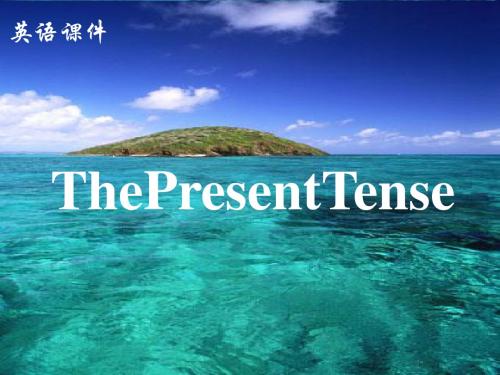
ever,never,before,just,recently,already
I have learnt English for three years. 我学英语(到现在)三年了(仍在学)。 2. I learnt English for three years. 我学了三年英语(现在不学了)。 3. I have written two letters this morning 今天上午我写了两封信,(说话时仍是上午)。 4. I wrote two letters this morning . 今天上午我写了两封信,(下午或晚上说的)。 注:表示不确定时间的状语,在句中无其它特定的 过去时间状语时,或无表示过去动作的从句时常与 现在完成时连用。 eg: 1. I have not written to my parents recently. 我最近一直未给父母写信。 2. I have met him many times before. 我以前见过他多次。
他已经买了一本英汉字典。 eg:2. He bought an English-Chinese dictionary. 他曾买过一本英汉字典。
第一句用现在完成时时态,意为:“He bought an English-Chinese dictionary. And he still has it” “过去他买 了一本英汉字典,现在他还有这本字典” 。 第二句用过去时只叙述过去他买过一本英汉字典这一 事实,至于现在他是否有这本字典并未强调说明。
eg: 1.
现在完成进行时的 主要用法
表示一个持续了一段时间,刚刚结束或仍在继续进行的 动作。与现在完成时有所有同的是现在完成进行时强调 动作本身或动作的持续性、持久性。
eg:1. We’ve been looking for you everywhere.where have you been?
一般过去时和现在完成时用法区别(详细点)

一般过去时和现在完成时用法区别(详细点)1) 经常性或习惯性的动作,常与表示频腮度的时间状语连用。
时间状语:every…, sometimes, at…, on SundayI leave home for school at 7 every morning.2) 客观真理,客观存在,科学事实。
The earth moves around the sun. 不受时间限制的Shanghai lies in the east of China. 客观存在表示格言或警句中。
Pride goes before a fall. 骄者必败。
注意:此用法如果出现在宾语从句中,即使主句是过去时,从句谓语也要用一般现在时。
例:Columbus proved that the earth is round..3) 现在时刻的状态、能力、性格、个性、特征。
I don't want so much.Ann Wang writes good English but does not speak well.比较:Now I put the sugar in the cup.I am doing my homework now.※4)由连词if unless before as soon as when once however 等引起的时间(条件、让步)状语从句,需要用一般现在时,表示将来时. 第一句用一般现在时,用于操作演示或指导说明的示范性动作,表示言行的瞬间动作。
再如:Now watch me, I switch on the current and stand back. 第二句中的now是进行时的标志,表示正在进行的动作的客观状况,所以后句用一般现在时。
现在完成时用法解析1.构成现在完成时是由助动词have(has)+动词的过去分词构成。
助动词说明该谓语是属于现在时范围。
它和主语的人称、数要保持一致。
过去分词是主要的谓语动词,说明句子的意义。
- 1、下载文档前请自行甄别文档内容的完整性,平台不提供额外的编辑、内容补充、找答案等附加服务。
- 2、"仅部分预览"的文档,不可在线预览部分如存在完整性等问题,可反馈申请退款(可完整预览的文档不适用该条件!)。
- 3、如文档侵犯您的权益,请联系客服反馈,我们会尽快为您处理(人工客服工作时间:9:00-18:30)。
一般过去时态和现在完成时态的区别练习题1)一般过去时态表示过去某时发生的动作或单纯叙述过去的事情,强调动作;现在完成时态中动作为过去发生的,强调过去的事情对现在的影响,强调的是影响。
如:I saw this film yesterday. (强调看的动作发生过了)I have already seen this film.(强调对现在的影响,电影的内容已经知了) I haven’t finished my work yet. (强调对现在的影响,还有工作要做,不能去玩) When did you finish your homework? (询问过去的动作所发生的时间,与现在无关)2)一般过去时态表示动作在过去已经停止;现在完成时态表示过去开始的动作一直延续到现在。
如:Ann visited her uncle last weekend.(visit这个动作在过去已经停止) They have lived here since 1983.(live here 这个动作从1983年开始,一直延续到现在)3)一般过去时态常用非延续性动词,如borrow, buy, come, go, leave, start, die, finish, become等。
现在完成时态可表示持续到现在的动作或状态,与时间段连用时动词一般是延续性的,如keep, have, live, teach, learn, work, study, know, be等。
如:He joined the League three years ago .(join 是短暂动词)He has been in the League for three years.(be in表状态,在团内的状态可延续) He has been a League member for three years. (是团员的状态可延续)4)一般过去时态常与具体的时间状语连用,而现在完成时态通常与模糊的时间状语连用,或无时间状语。
一般过去时态的时间状语:yesterday, lastnight/week/month/year…,…ago, in1980, just now等,皆为具体的时间状语.现在完成时态的时间状语:for+时间段, since+过去的时间点/一般过去时态的句子, so far, , up to now, in thepast ....years, 等,皆为不确定的时间状语。
如:Tim wrote a letter to his brother last night.(last night 为具体的过去时间状语,所以用一般过去时态)I’ve learned English for three years .(for three years为时间状语,是个时间段,时间跨度大,不具体)学以致用1.——When _____ you _____ to learn to skate?----Five years ago.A. do; startB. will; start现在完成时态详细讲解及其练习一、现在完成时由“have/has+过去分词”构成,主要有两个含义:①表示过去发生的动作对现在造成的影响和结果,常用的时间状语有many times,just,yet,ever,never,just,already,so far, by now等。
I have already watched the TV play. 我已经看过这部电视剧了。
(现在我对它不感兴趣了)——Have you found your lost pen yet?——No, I haven’t found it yet.(我很着急)②表示动作或者状态在过去已经开始,持续到现在,也许还将持续下去。
用于延续性动词,常常与so far、for或者since 短语连用。
since + 时间点 /从句,for + 时间段,如for two months等。
二、现在完成时态和一般过去时态的区别1)现在完成时和一般过去时都能表示过去发生过的动作,但现在完成时表示过去动作对现在的影响,并且表示这一动作已完成或还可能继续下去;2)而一般过去时与现在的情况没有联系,仅表示过去的动作,且这一动作到说话时已终止。
因此现在完成时不能与表示明确的过去时间如:in1949,yesterday,last week等的状语连用,并且用when或where对这些时间和地点状语提问时,一般只用一般过去时。
三、在“it is first/second...time that...。
”或在“it/this/that is the +最高级+名词+that...。
”结构中,that从句中的动词常用现在完成时;在“it + be ...+since 从句”这一结构中,be可用一般现在时或现在完成时,since 从句一般用过去时。
现在完成时可以和带有 since 或 for 等表示“一段时间”的状语连用,表示动作或状态从某一时刻开始,一直持续到现在。
如:I haven't seen him for two years.但是,像 come, arrive, buy 等终止性动词不能与表示“一段时间”的状语连用。
要用,必须改为“be(在)”等延续性动词来表述。
现归纳总结一下由非延续性动词到延续性动词的转换:arrive→be heredie →be dead begin(start)→be on come back→be back fallill(sick,asleep)→be ill(sick,asleep) leave →be away get up→be up finish →be over open →be open close →be closed borrow →keep或 be on →be in 或 be a member of…go to school→be a student buy →have catch(a cold)→ have(a cold) begin to study→study get to know→know come to work→work 等如:He has been a soldier for three years.他参军三年了。
His father has been dead for two years.他父亲去世二年了。
The film has been on for ten minutes.电影已开始十分钟了。
We have studied English for three years. 我们(开始)学英语已三年了。
几点注意事项(1)have been(to)与 have gone( to)的区别:have been(to)表示“去过某地(现在已经回来了)”,可用于各人称;have gone(to)表示“去某地了(说话时某人不在当地)”,常用于第三人称,前者可与 once , never, several times 等连用,后者则不能。
He has been to Beijing.他去过北京(已经回来了)He has gone to Beijing . 他去北京了。
(还没有回来)have/has been in 待在某地如:They have been in Beijing.他们呆在北京。
(2)终止性动词现在完成时的否定式,已变成一种可以延续的状态,因此可以和表示一段时间的状语连用。
如:I haven't left here since 1997.自从 1997 年以来,我一直没有离开过这儿。
现在完成时态练习题一选择填空。
( ) 2. Her father ______in1990 and her husband______for more than five years.(A) died ,dead (B) has died, dead(C) died ,has been dead (D) has died, has died( ) 3. I have _____this nice watch for two years.(A) had (B) bought (C)borrowed (D) lend( ) 4.He _____his home for ten years.(A)has left (B)left from (C)has been away from (D)was away from( ) 5.He _____a league member for three years(A)is (B)has been (C)hasbecome (D)have become( ) 6.Lihua's brother has _______for two years(A)joined the army (C)become a soldier(B)been an army (D)been in the army ( ) 7.He hasn't _____Quanzhou ever since he left school(A) left (B)beenaway (C)been (D)away二选择填空( ) 1. ——Have you finished your homework ——Yes, I _______it last night(A) finish (B)finished (C)have finished (D)will finish( ) 2.—— ________you ever _______to Nanjing ——Yes, I ______there last year. (A)Have…gone, have gone (B)Did…go, went (C)Have…been , went (D)Did…go, has , been )( ) 3.——When _______you ________Lucy in New York?——I _________her for two years(A) did…meet, haven'tseen (B)did…meet, don't see(C) have…met, haven't seen( ) 4.He ______finished his homework yet .( A) didn’t (B)haven’t (C)hasn’t (D) doesn’t have( )5.——Have you ________traveled on the banch?——Yes, I have.(A)just (B)yet C)never (D)ever( )6..——Have you finished your homework——Not__________(A)ever (B)already . (C)yet (D)just .( ) 7 We haven't finished our homework,_____.(A)already ( (B)ever (C)yet (D)never ( )8.——Have you__________ learned English? ——Yes, I've ________learned a lot.(A)never, ever (B)ever, never(C)ever, already (D)already. ever( ) 9.——Have you finished your homework ________? ——Yes, I've _____done that.(A) yet,already (B)already, yet (C)ever,never (D)still, just( )10.John's father _______borrowed some pictures(A ) has just (B)have ever (C)has yet (D)have already三用 since 和 for 填空(一)1) ______ two years _______ two years ago 2) _______ last month 3) _______ yesterday 4)_______ an hour ago 5) ______ she left here 6) _______ 4 o’clock 8) ______ 19999) ______ 4 hours 10) _____ lunch time(二)1. He has lived in Nanjing ________ the year before last.2. I’ve known him __________ we were children.3. Our teacher has studied Japanese _________ three years.4. She has been away from the city ___________ about ten years.5. It’s about ten years __________ she left the city.四单项选择题( )1.My mother has worked in this factory _____2 years.(A)about ( (B)for (C)in (D)since( )2. His father joined the party_________(A)since three years ago (B)in two years' time(C)for three years (D)three years ago3. The students have cleaned the classroom , ________?A. so theyB. don’t theyC. havethey D. haven’t they4.We came to Nanjing three years ago, so we ________ here for three years.A. have been toB. have been inC. have beenD. have gone5.- How long ______you_______ your dictionary?- About two months.A. did; buyB. have; getC. have; hadD. have; bought6. He tells me he________ China for over five years. A. has been B. has been inC. has been toD. has gone to China7.________has Mr White been a member of Greener Chinasince he _______ to Nanjing?A. How soon , comesB. How often, gotC. How long , cameD. How far, arrived8. His uncle________ for more than 9 years.A. has come hereB. has started to workC. has lived thereD. has left the university9. He has never surfed, __________(改成反意疑问句)?10. They have been here since 2000 . (对划线部分提问)__________ have they been here?11. The old man _________last year. He________ for a year.(die)12. This factory opened twenty years ago.(改写句子,句意不变)。
